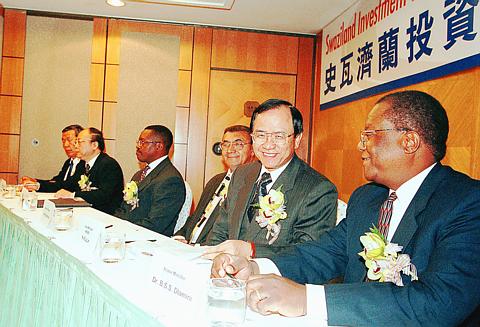Swaziland officials were in town yesterday to lure Taiwanese investors to their country, citing the success of one local garment company as support for their cause.
"We will ensure stable political and economic development and create an unfettered investment environment for Taiwanese companies," Dr. Barnabas Sisbusiso Dlamini, Swaziland's prime minister said yesterday at an investment seminar in Taipei.
Dlamini currently heads a delegation to Taiwan on a mission to entice investment, particularly in labor-intensive industries, to Swaziland, Taiwan's 31-year-old diplomatic allies in southeast Africa.

PHOTO: CHIANG YING-YING, TAIPEI TIMES
He added that the Swaziland government puts great importance on Taiwanese investment, and pointed out that ventures by Taiwanese company Tuntex Inc (
Currently Tuntex Inc, a subsidiary of the Tuntex Group (
The company has textile investments in Singapore, China, Indonesia and Mexico.
Tuntex suffered a slight loss of US$110,000 in 1998 but enjoyed a turnaround the next year, reporting profits of US$ 500,0000 against a revenue of US$10 million.
"The free garment export quota to the US and EU that Swaziland enjoys makes it a very attractive investment destination for us," said Stand Lin (
He also identified other incentives for Taiwanese investors, including five-year free of sales and income tax, low rents for leasing land for factories and easily trained labor. Tuntex Inc pays only US$16 for per 15,000 square meters on a 50-year lease.
The company exported all of its production -- such as polo shirts -- to the US and Europe, he said.
Lin acknowledged that the development of some textile-related industries still requires the company to rely on imports of materials from Asia.
Tuntex Inc plans to expand its operations in Swaziland to include weaving and dying by 2006, hoping to reach revenue from garments of US$830 million and to eventually employ 9,000 workers.
Swaziland has a population of one million, with annual export growth of 17 percent. The GDP growth from 1990 to 1997 was an average 2 percent per year.
The current foreign investment is mainly from commonwealth nations, according to the official Swaziland Investment Promotion Authority (SIPA).
Bhekie R.Dlamini, chief executive officer at SIPA, said the country hopes to further exploit it targets natural resources, such as sugar, agricultural and forestry products, and tourism for further foreign investment. Labor-intensive manufacturing, he added, is also a key target for upgrading.
Dlamini also said his country hopes to attract leather and toy manufacturing and agricultural processing industries.

Intel Corp chief executive officer Lip-Bu Tan (陳立武) is expected to meet with Taiwanese suppliers next month in conjunction with the opening of the Computex Taipei trade show, supply chain sources said on Monday. The visit, the first for Tan to Taiwan since assuming his new post last month, would be aimed at enhancing Intel’s ties with suppliers in Taiwan as he attempts to help turn around the struggling US chipmaker, the sources said. Tan is to hold a banquet to celebrate Intel’s 40-year presence in Taiwan before Computex opens on May 20 and invite dozens of Taiwanese suppliers to exchange views

Application-specific integrated circuit designer Faraday Technology Corp (智原) yesterday said that although revenue this quarter would decline 30 percent from last quarter, it retained its full-year forecast of revenue growth of 100 percent. The company attributed the quarterly drop to a slowdown in customers’ production of chips using Faraday’s advanced packaging technology. The company is still confident about its revenue growth this year, given its strong “design-win” — or the projects it won to help customers design their chips, Faraday president Steve Wang (王國雍) told an online earnings conference. “The design-win this year is better than we expected. We believe we will win

Quanta Computer Inc (廣達) chairman Barry Lam (林百里) is expected to share his views about the artificial intelligence (AI) industry’s prospects during his speech at the company’s 37th anniversary ceremony, as AI servers have become a new growth engine for the equipment manufacturing service provider. Lam’s speech is much anticipated, as Quanta has risen as one of the world’s major AI server suppliers. The company reported a 30 percent year-on-year growth in consolidated revenue to NT$1.41 trillion (US$43.35 billion) last year, thanks to fast-growing demand for servers, especially those with AI capabilities. The company told investors in November last year that

Power supply and electronic components maker Delta Electronics Inc (台達電) yesterday said it plans to ship its new 1 megawatt charging systems for electric trucks and buses in the first half of next year at the earliest. The new charging piles, which deliver up to 1 megawatt of charging power, are designed for heavy-duty electric vehicles, and support a maximum current of 1,500 amperes and output of 1,250 volts, Delta said in a news release. “If everything goes smoothly, we could begin shipping those new charging systems as early as in the first half of next year,” a company official said. The new